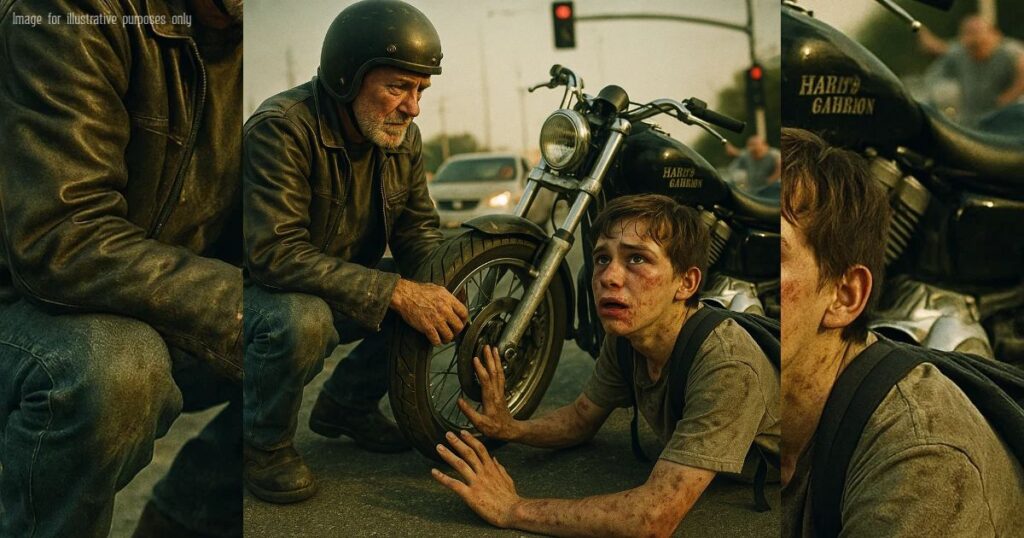He didn’t step into the crosswalk.
He slid under my front wheel, palms pressed to the hot rubber like he could hold back the world with his hands. Traffic froze around us. A chorus of horns swelled, metal and impatience, summer heat coming up off the asphalt like breath from something alive. The boy tilted his face up to me. One eye was swelling shut. Dry blood traced his lip. A school backpack hung off one shoulder by one strap, as if the other had given up.
“Please,” he said, voice scraping air. “If you ride away, my brother dies tonight.”
I killed the engine. The sudden silence felt like a cliff.
Behind us, a driver leaned out his window and shouted for me to move, then thought better of it when he saw the kid literally under my tire. I set the kickstand, swung off, and squatted so we were eye to eye.
“What’s your name?” I asked.
“Noah.” His hands shook so hard he almost dropped the phone. He thrust it up. A live video filled the screen. A dim room. A child, maybe twelve, tied to a chair. Raw concrete behind him. His cheeks were blotchy with tears but his mouth was set like he’d practiced courage in the mirror. In the corner of the screen, a countdown clock ticked under a QR code. 07:58:12.
“That’s Eli,” Noah said. “They took him at lunch. They said midnight. They said if I didn’t bring money they’d—” His voice folded. He swallowed. “They’re making me watch.”
I’ve been riding long enough to know the difference between a stunt and the sound a human makes when they’ve run out of places to put their fear. I looked once more at the screen, at the boy in the chair, then back at Noah.
“Stand up,” I said gently. “You’re safe with me.”
He let me pull him to his feet. His knees buckled, then held. Cars slid around us now, angry in that way people get when their lives are delayed—honking at whatever kept them from the next light. I guided Noah and my bike to the curb. He stayed close, like a shadow you can feel touching your skin.
“My name’s Ray,” I said. “We’re going to fix this.”
“You don’t know us,” he said, as if that were the part he still couldn’t believe.
“You will,” I said, and took the phone.
The video anchor light flared again, washing the basement in pale blue. A man’s voice off-screen said, “Smile for your brother, little man.” Eli kept his eyes level like he refused to feed a fire. The QR code pulsed. I took a screenshot. Then I hit dial on a number that’s been in my phone since the day my son died.
“Marisol,” I said when she answered. “I need eyes and a map.”
“Ray.” Sergeant Marisol Vega’s voice carried exhaustion and an edge sharpened by the good kind of anger. “I heard you sold the old touring bike and went practical.”
“I still have what matters,” I said. “There’s a child in a basement with a clock going the wrong way. The video’s coming from a warehouse. I want the city’s list of properties that got seized last year. Every structure along the river with a basement and lousy public lighting.”
“I’m suspended,” she said. “You know that.”
“Suspended doesn’t mean you don’t know where the bones are buried.”
A pause. Keyboard sounds. “I can’t come with you.”
“I’m not asking you to,” I said. “I’m asking you to put a flashlight where the dark is thickest.”
She exhaled. “Check your text. Look at Warehouse Nine on Riverview. The city uses it for storage.”
“Been a mess since they outsourced security. I’ll ping you more intel as I get it.”
Before I could thank her, another call came in. I let it ring twice to steady my hands and answered.
“Ray?” Lila’s voice. Nurse Lila Ortiz from the ER. I owe her more than one lifetime.
“Marisol said you’re heading into something. She said there’s a kid.”
“Two,” I said. “The one we can reach is tied to a chair. The other is breaking on the sidewalk.”
“Do they have any medical issues?” she asked, already moving. I could hear the rustle of a kit bag.
I looked at the live stream again. A plastic sensor stuck to Eli’s arm.
“There’s a blood glucose sensor. The alarm—” I caught it then, faint through the phone’s little speaker. A repetitive chime.
“Type 1 diabetes,” she said. “If they’re withholding insulin, he’s on a clock that’s not just internet theater.”
“Send me your location. I’m packing insulin, glucagon, a meter, and fluids. I’ll meet you near the warehouse.”
“Keep him alive with water if you can. Don’t give him anything to eat until I check him.”
I thanked her and hung up. Then I sent a group text.
I didn’t need a club. I needed brothers who had nothing to prove and everything to protect.
The replies came quick, as they always did. On my way. I’ve got zip ties.
Bringing bolt cutters. I’ve got the med bag. My old bones and your bad shoulder, Ray—we’ll make a pair.
I showed Noah the map. He nodded like he’d memorized the whole city by heart.
“They call it the Cold House,” he said. “It used to be ice storage, before the new stuff came in.”
“Who’s they?” I asked.


